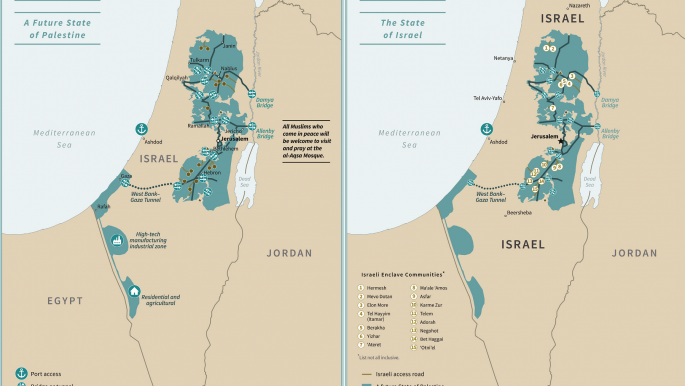'Deal of the Century' mastermind Kushner reveals he read 25 books on the Israel-Palestine conflict
US President Donald Trump's son-in-law and senior adviser Jared Kushner, who worked on the recently unveiled - and widely condemned - Israel-Palestinian peace plan, said he has read 25 books on the conflict.
Kushner, who spearheaded the so-called "Deal of the Century", the long-awaited plan aimed at resolving the Israeli-Palestinian conflict, told Sky News Arabia about his reading history, according to Bloomberg's Breaking News Editor.
Trump unveiled long-awaited details of the "Deal of the Century" Tuesday, saying Jerusalem would remain Israel's "undivided capital".
The plan was revealed at a White House press conference alongside Israeli Prime Minister Benjamin Netanyahu but no Palestinian representation.
As part of the plan, future Palestinian statehood would be based on a series of strict conditions - including requiring the future state to be "demilitarised".
While the peace plan has garnered support from some Western and Gulf allies - including Saudi Arabia, the UAE and the UK - it has been rejected by Palestinians.
Among the deal's widely rejected principles is the proposed Israeli annexation of West Bank settlements and the Jordan Valley, which is viewed as being completely unacceptable by Palestinians.
Kushner began working on the proposal in 2017 in a largely secretive process.
|
Speaking to Fox News on Tuesday, Kushner sold the plan, saying: "Past proposals have been 2 to 3 pages - this is an over 80-page proposal with a map. Never been done before."
Kushner already unveiled an economic component of the plan in June in Bahrain, with promises of $50 billion of investment in the Palestinian territories and its neighbours.
The Palestinians boycotted the presentation, calling it a way to buy off their political aspirations.
Supporters of the White House initiative have long counted on the relationships forged by Kushner with several Gulf monarchs, as well as on the informal contacts between some Arab countries and Israel.
Their hope is that Saudi Arabia can pressure the Palestinian Authority to accept the peace plan, boosted by its economic component released in June, which anticipates $50 billion in international investments pouring into the area over 10 years.
What is the 'Deal of the Century'?
Unveiled after a three-year wait on Tuesday, Trump's so-called "Deal of the Century" claims to be an "historic opportunity" for "two states", but would see Israeli occupation of most Palestinian lands in the West Bank.
The US president claims peace plan would more than double territory earmarked for a Palestinian state and grant the future state a capital in East Jerusalem, although others have described the deal as "farcical".
Israel would be granted an "undivided" capital in Jerusalem under the deal and also be given a green light to annex the Jordan Valley - a vital zone which makes up some 30 percent of the West Bank - and Israeli settlements, which are widely considered illegal under international law.
Israel would be allowed its capital in Jerusalem with all territory west of the separation wall, including the historic old city and major Palestinian-majority neighbourhoods, whereas Palestine would be granted only areas of Jerusalem to the east of the wall.
Read More: Trump's plan leaves Palestinians no option but to reject it. Just as he intended
In return for lost territory in the occupied West Bank, the future Palestinian state would be granted territories in the sparsely populated Negev desert close to the Egyptian border. Other concessions include $50 billion worth of investment in the future state and access to two ports.
Both officials from the Palestinian Authority and protesters across the West Bank and besieged Gaza Strip have already rejected the deal, which critics say is overwhelmingly pro-Israel and will prevent the formation of a viable Palestinian state.
Maps unveiled by the White House on Tuesday reveal how the future states of Israel and Palestine would look if the deal is realised.
 |
Agencies contributed to this report.
Follow us on Twitter and Instagram to stay connected



